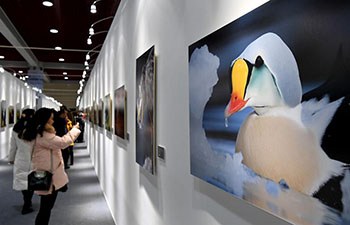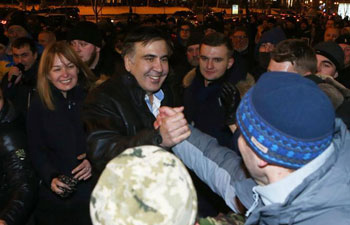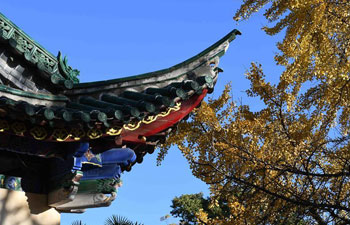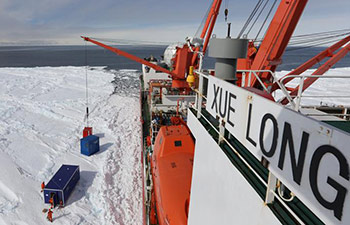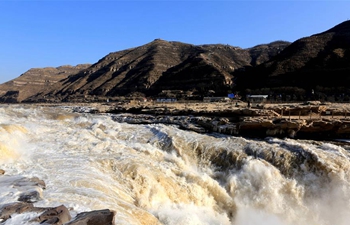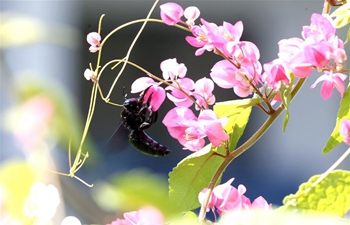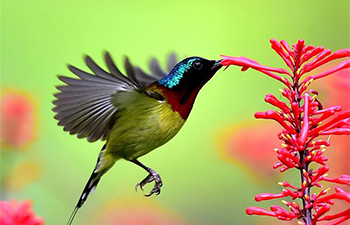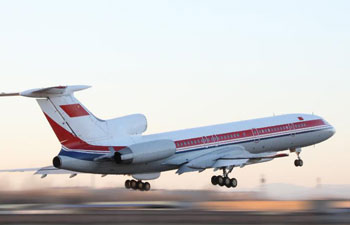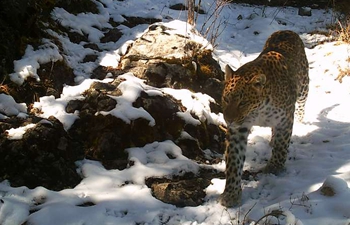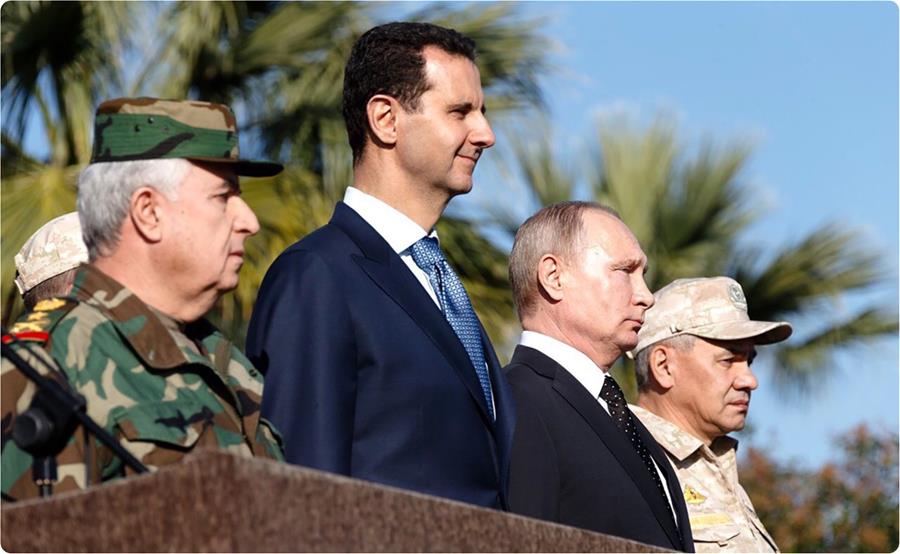
Syrian President Bashar al-Assad (2nd L, Front) and his Russian counterpart Vladimir Putin (2nd R) view a military parade in the Russian-run Hmeimim Air Base in the coastal city of Latakia, Syria, on Dec. 11, 2017. Syrian President Bashar al-Assad met with his Russian counterpart Vladimir Putin in Syria on Monday, the presidential media office reported. During Putin's visit, he ordered his defense minister to prepare for withdrawing the Russian forces, according to the report. (Xinhua/Syrian Presidency)
by Burak Akinci
ANKARA, Dec. 12 (Xinhua) -- Russian President Vladimir Putin's tour to the Middle East on Monday underscores the growing influence of Moscow in the volatile region amid the diminishing American capacity, said local analysts.
In less than 24 hours, the Russian leader visited war-torn Syria, and then had rapid discussions with his counterparts in Egypt and Turkey, two regional actors.
His excursion came as Muslim nations are lashing at the U.S. President Donald Trump's unilateral decision to recognize Jerusalem as the capital of Israel, the latest in a series of decisions which have increasingly isolated the U.S. in the world's probably most vulnerable region.
During a short visit to a Russian air base in Syria, where he was greeted by President Bashar al-Assad, Putin said Russia's military had achieved its mission and would head home shortly.
In Egypt, Putin discussed several issues with President Abdel Fattah al-Sisi and confirmed that Russia has agreed to resume direct tourist flights to Egypt, which have been suspended since the bombing of a Russian airliner in the Sinai Peninsula in 2015, a move that could bring back billions of U.S. dollars in revenue to Cairo.
On the economic cooperation, they confirmed the signing of a contract for Russia to build a 30-billion-dollar nuclear plant, the first of its kind in Egypt.
The two countries are also researching possibilities for the Russian air force to use Egyptian military bases, which would consolidate the growing influence of Moscow in a country as an historic U.S. ally.
EIGHTH PUTIN-ERDOGAN MEETING
The third and final stop of Putin's excursion was NATO member Turkey, where the focus was Syria, energy issues and the sale of the advanced Russian S-400 air missile defense system to Ankara.
At a joint press conference in Ankara, Turkish President Recep Tayyip Erdogan said the deal, which is a major snub to the U.S. and NATO, will be soon finalized.
The two countries will "come together to conclude necessary work for S-400," said Erdogan, who was meeting Putin for the eighth time this year.
Experts believe Russia is filling the vacuum left by the U.S. "unwillingness" to address the complex Middle East issues for the past years, through forging pragmatic alliances in the region with players as Turkey and Egypt.
"The Syrian war and the reluctance of the U.S. to engage in the crisis have created a perfect opportunity for Russia, which has a historical ambition to reach the Mediterranean basin," Oytun Orhan, a Syrian analyst at the Ankara-based think thank Orsam, told Xinhua.
"The U.S. unwillingness to play a bigger role in this part of the world was used by the Russians to up their game by creating alliances with countries generally frustrated by this American strategy," Orhan said, referring to Turkey, Egypt and Iran.
"Russia managed to take advantage of a crisis to showcase her growing global influence on the political and military table," he said.
According to the Syrian analyst, since the Islamic State (IS) is defeated on the ground in Syria, Moscow is ready to play a diplomatic role in the political reshaping and reconstruction of Syria after nearly seven years of a deadly civil war.
In Syria, Putin reassured that Russian forces had defeated the threat from IS militants.
"In two years, the Russian armed forces, together with the Syrian army, have defeated the most combat-capable group of international terrorists," Putin said in a speech at the Hmeimim air base in Syria, where his country has and will have a permanent presence.
"A significant part of the Russian military contingent in the Syrian Arab Republic is returning home, to Russia," he added, without giving a precise figure and timetable.
RUSSIA AT FOREFRONT IN SYRIAN DIPLOMACY
The consolidation of Russian presence in the region "is the result of the strategy pursued by the U.S., and Russia took advantage of this situation," Togrul Ismayil from the Economics and Technology University (TOBB) of Ankara told Xinhua.
"The Jerusalem decisions is also a major opportunity for Russia to side by disgruntled Muslim states with which it is forming pragmatic alliances highlighting its influence in countries such as Egypt and Turkey, which were once staunch U.S. allies," the expert said.
Analysts, however, point out that Russia does not want to live again the "Afghanistan trauma" this time in Syria and will push belligerent parties for a viable peace once hostilities end on the ground.
"The credibility of Russia will be at stake on the diplomatic front so it needs to have the support of regional powers like Turkey to make future peace work," noted Oytun Orhan.
Negotiations are continuing in Geneva and Astana and the position of Russia will surely be a game changer for a brokered peace, according to experts.
Turkey has a 900 km border with Syria and has accepted some 3.3 million Syrian refugees fleeing the war. The Turkish president, who had pressed for the ousting of Assad, now no longer insists on his removal as a precondition of peace talks.
Turkey has sent groups in the Syria's Idlib to monitor de-escalation zones there. Erdogan said during his meeting with Putin that a second meeting should be held in Sochi with Iran and Russia this week, after a first meeting was organized in the Black Sea resort three weeks ago.
SYRIAN KURDS, SOURCE OF CONTENTION
But Russia and Turkey could eventually come at loggerheads on the future presence of the Syrian Kurds at the negociating table.
The U.S.-backed Syrian Kurdish fighters who have battled IS in Syria control a significant stretch of land and their participation on the future of Syria is out of the question for Ankara who consider this militia as a "terrorist organization" because of its close links with the Kurdistan Workers' Party (PKK).
"This is our red line, we cannot be at the same table at the same time with a terrorist organization," a source close to the Turkish government told Xinhua.
"We consider People's Protection Units (YPG) and the Democratic Union Party (PYD) as the Syrian branch of the PKK, which is a listed terrorist group by the United States and the European Union as well, so it is simply out of the questions that we make a concession on this," added this source on the condition of anonymity.
"In the short or medium term, the YPG issue can become a problem between Turkey and Russia," underlined Oytun Orhan, while Ankara is increasingly concerned that weapons delivered to the Syrian fighters by the U.S. could be transferred to rebels in Turkey.
Turkish Foreign Minister Mevlut Cavusoglu told NTV news channel on Tuesday that his government has provided the Russian side a list of Syrian Kurdish opposition groups that Ankara would not object in the Syrian National Dialogue Congress initiative led by the Kremlin.
But he also repeated threats that Turkey would send combat troops into northern Syria if it felt its national security were at stake.
"YPG represents only a fraction of Kurds in Syria. There are other Kurdish groups there and also in Europe and we are in contact with all of them," said the minister.




